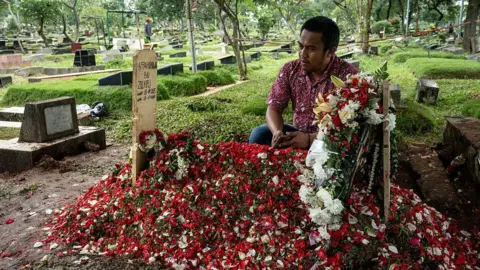In a tragic turn of events, Hollywood legend Gene Hackman, known for his remarkable acting prowess, passed away at 95, just one week after his wife, Betsy Arakawa, succumbed to a rare virus. Medical experts posit that Hackman, suffering from advanced Alzheimer's disease, may have been entirely unaware of his wife's death, leading to a harrowing last week replete with confusion and emotional turmoil. The couple's bodies were discovered in their Santa Fe home after local security officers conducted a welfare check.
Authorities initially described the situation as suspicious due to the advanced decomposition of the deceased. Arakawa, aged 65, was found in a bathroom among scattered medication, while Hackman was near the kitchen with a cane and sunglasses. A police investigation deemed the deaths were not the result of foul play, unveiling a tragic story of the detrimental effects of Alzheimer's disease.
Experts emphasize the profound impact of Alzheimer's on those suffering from it. Catherine V Piersol, an occupational therapist with significant experience in dementia care, described how Hackman may have relived the moment of loss repeatedly without realizing the permanence of his wife's condition. This cyclical pattern of confusion complicates the emotional processing of grief for patients facing advanced stages of dementia.
New Mexico's chief medical examiner, Dr. Heather Jarrell, confirmed that Arakawa died from hantavirus pulmonary syndrome, while Hackman’s death stemmed from natural causes compounded by serious heart disease. Notably, his lack of nourishment in the days following Arakawa's death suggests a troubling absence of awareness and capacity to care for himself.
The reality of Hackman's isolation, spending days without attracting assistance or initiating contact, raises pressing questions about the support systems available to aging couples facing health crises. Residents of Santa Fe expressed grief and shock at the couple's ordeal, particularly in light of the couple's lengthy privacy and Hackman's recognizable presence in the community, where he often charmed locals with his affable nature.
As society grapples with an aging population, issues concerning caregiver support and the emotional burden placed on families become increasingly pronounced. Behavioral scientist Laura N Gitlin emphasized the growing trend of fewer caregivers available to assist elderly individuals, drawing attention to the realities that many families confront regarding aging and support in times of crisis.
The tragic story of Gene Hackman and Betsy Arakawa serves as a stark reminder of the emotional and physical realities of Alzheimer’s disease and the importance of community support in caring for vulnerable loved ones.






















